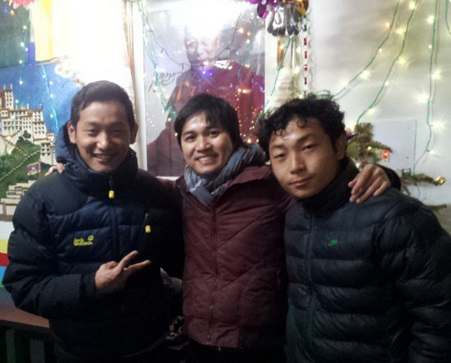
Sherwin (centre) with Lha Tibet Fair Trade manager Tenzin Sherab (right) and former staff Jigme (left)
What makes home a home? Since commencing my volunteering stint at Lha last December, I have been thinking a lot about the notion of “home”, both as a spatial and a political concept, and how my experience working and interacting with many Tibetans in exile has profoundly made me re-think what home means. For someone who has been living as a nomad (or perhaps, a privileged self-imposed exile), for a while now, studying around Europe for a year and a half then spending another year travelling around Asia upon my return home to the Philippines, defining home, within the context of this mobility, can be very difficult. And having lived in Dharamshala has further complicated the constitution of my home.
I worked at the Lha Tibet Fair Trade store, the first of its kind in McLeod Ganj, and helped Tenzin Sherab, who I now consider as my “first Tibetan friend”, in marketing and promoting the shop online. All profits from the store go directly to help fund the organisation’s numerous projects, and all the items in the store are locally designed and hand-crafted by Tibetan refugees, so, in a way, the shop functions as a “home” to many Tibetan artists and craftsmen as it is a means of supporting their livelihoods.
While working in the shop, I had many interesting conversations with Tenzin, who was patient enough to answer all my unending, random questions about Tibet with extreme enthusiasm. A mutual exchange of beliefs and opinions happened between us and we discussed a plethora of issues surrounding the Tibetans’ struggle for freedom, the horrific toll of self-immolations, and the potency of non-violence as a political approach. I even asked him once if he ever wanted to go to Tibet and be with this family again. His answer left me baffled as he could not give a direct or clear-cut response to the question. It was neither a “Yes” nor a “No”. He expressed a desire to be reunited with his parents but remains ambivalent because he knows his life will be difficult in Tibet given the current socio-political conditions and restrictions there. Apparently, my question is not simple at all and revolves around the complex psychology and politics of home of someone who has been living most of his life as a refugee in a “home away from home.”
As a whole, volunteering at Lha has been a great, rewarding experience. Along with a long list of extra-curricular activities that I attended such as the Dalai Lama’s teachings, Mass Clean Up, and International Himalayan Festival, I will particularly remember the fun Christmas party and dinner with the staff and fellow volunteers. I will also treasure my everyday encounters with friendly locals, who were always exuding a positive aura, whenever I embarked on a pilgrimage-like journey from my apartment in Jogiwara to the Lha Office in Temple Road, and vice versa. Beyond the tranquil, picturesque wonders of Dharamshala, the warm hospitality of all the staff made my stay so much more enjoyable and memorable.
I was welcomed, unconditionally, in the organisation and treated like a member of the family. Lha became my home – a place of belonging – and I cannot wait to return.




 Print
Print Email
Email













